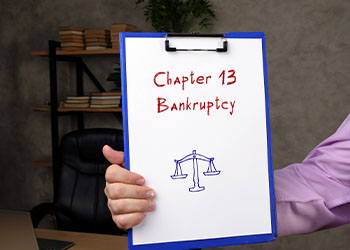Can I Continue to Pay Into a Retirement Account Under Chapter 13?
Nov. 15, 2023
 Navigating the complexities of Chapter 13 bankruptcy can be daunting, particularly when you are also concerned about the status of your retirement accounts. It's understandable if you're feeling overwhelmed.
Navigating the complexities of Chapter 13 bankruptcy can be daunting, particularly when you are also concerned about the status of your retirement accounts. It's understandable if you're feeling overwhelmed.
Seeking legal guidance from an experienced attorney like Scott N. Tisevich is essential for achieving the best possible results and protecting your financial future. At the Law Office of Scott N. Tisevich, he has the resources and knowledge to analyze your situation while keeping your best interests in mind. He serves clients across a broad geographical area that includes not only Reno but also Carson City and Las Vegas. Additionally, he extends his services to clients throughout Churchill County, Lyon County, Story County, and Douglas County in Nevada.
What Is Chapter 13?
Chapter 13 bankruptcy is a legal process designed specifically for wage earners with regular income who are looking to regain control over their debt. It allows individuals to propose a repayment plan to pay off their debts over a period of three to five years. Unlike Chapter 7, Chapter 13 bankruptcy lets filers keep all their assets, including their home or car, making it an attractive choice for many. However, for Chapter 13, there are specific requirements regarding the amount of secured and unsecured debt one can have.
Are Retirement Accounts Protected in Chapter 13 Bankruptcy?
Generally, retirement accounts are protected in Chapter 13 bankruptcy. According to the U.S. Bankruptcy Code, certain retirement accounts like 401(k)s, IRAs, and pension plans are deemed exempt assets, meaning they're not subject to liquidation or distribution to your creditors. So, if you're filing for Chapter 13 bankruptcy, you can usually preserve your retirement accounts and continue making contributions to them while you're in the repayment plan.
However, it's important to note that specific rules and exemptions regarding retirement accounts may differ depending on jurisdiction and the type of retirement account you have. That's why it's crucial to consult with an experienced bankruptcy attorney like Scott N. Tisevich, who can help you fully understand the protections and implications of retirement accounts in Chapter 13 bankruptcy. Remember, protecting your future is just as important as resolving your present financial difficulties.
Can I Continue Making Contributions?
Under Chapter 13 bankruptcy, you are required to make your "best effort" to repay your debts. This means all disposable income, which is the income left after paying all necessary living expenses, must be dedicated to repaying your creditors. While you can continue making contributions to your retirement accounts during this time, the amount you contribute may come under scrutiny by the court. They will assess whether your contributions are reasonable based on your income, expenses, and overall financial situation.
Possible Exceptions
In the context of Chapter 13 bankruptcy in Nevada, retirement accounts like 401(k)s, IRAs, and pension plans are generally considered exempt assets. This means they are typically shielded from creditors and not included in the bankruptcy estate that's used to pay off debts. However, there can be exceptions to this rule that could potentially put these funds at risk.
For instance, if the court determines that the funds in a retirement account are excessive or unreasonable relative to the debtor's income and other financial circumstances, those funds might be included in the bankruptcy estate. The rationale behind this is to prevent debtors from sheltering unreasonable amounts of money in retirement accounts to the detriment of their creditors.
Another possible exception arises if the debtor has made fraudulent transfers or contributions to the retirement account with the intention of defrauding creditors. In such cases, those specific funds might be considered non-exempt and thus could be used to satisfy the debtor's obligations to their creditors.
Lastly, while mandatory retirement contributions are usually allowed during a Chapter 13 bankruptcy, voluntary contributions may come under scrutiny. Some jurisdictions might allow for reasonable and necessary contributions, particularly if the debtor is nearing retirement age. However, this is assessed on a case-by-case basis, taking into account factors like the debtor's age, income, expenses, and overall financial situation.
Navigating these potential exceptions requires a nuanced understanding of bankruptcy laws and their application. That's why it is always beneficial to seek legal help.
How a Bankruptcy Attorney Can Help
A bankruptcy attorney like Scott N. Tisevich can provide indispensable assistance throughout the Chapter 13 bankruptcy process. He can help you understand the specific rules followed by your court or jurisdiction and assist in creating a repayment plan that takes into account your retirement accounts. His experience and knowledge of bankruptcy laws will help you navigate the complexities of the legal system and help you comply with the "best effort" requirement.
Legal Guidance You Can Rely On
If you're currently navigating Chapter 13 bankruptcy and have concerns about your retirement accounts, it's vital to seek legal guidance. Scott N. Tisevich, Attorney at Law, provides the necessary support to protect your assets and guide you towards a healthier financial future. With his help, you have a better chance at successfully navigating the complexities of Chapter 13 bankruptcy.
The Law Office of Scott N. Tisevich proudly helps clients in Reno, Las Vegas, Churchill County, Lyon County, Story County, and Douglas County, Nevada.
